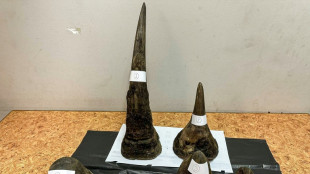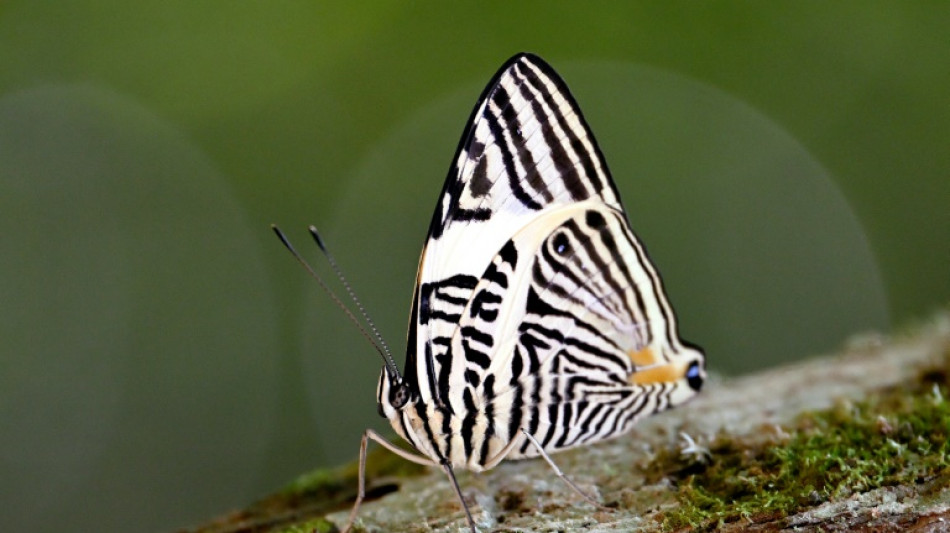
-
 No excuses for Shiffrin after Olympic team combined flop
No excuses for Shiffrin after Olympic team combined flop
-
Pool on wheels brings swim lessons to rural France

-
 Europe's Ariane 6 to launch Amazon constellation satellites into orbit
Europe's Ariane 6 to launch Amazon constellation satellites into orbit
-
Could the digital euro get a green light in 2026?

-
 Spain's Telefonica sells Chile unit in Latin America pullout
Spain's Telefonica sells Chile unit in Latin America pullout
-
'We've lost everything': Colombia floods kill 22
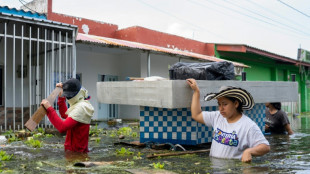
-
 Farhan propels Pakistan to 190-9 against USA in T20 World Cup
Farhan propels Pakistan to 190-9 against USA in T20 World Cup
-
US to scrap cornerstone of climate regulation this week

-
 Nepal call for India, England, Australia to play in Kathmandu
Nepal call for India, England, Australia to play in Kathmandu
-
Stocks rise but lacklustre US retail sales spur caution
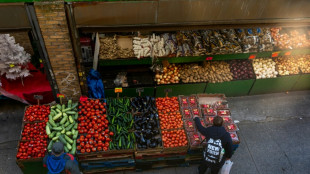
-
 Olympic chiefs let Ukrainian athlete wear black armband at Olympics after helmet ban
Olympic chiefs let Ukrainian athlete wear black armband at Olympics after helmet ban
-
French ice dancers poised for Winter Olympics gold amid turmoil

-
 Norway's Ruud wins error-strewn Olympic freeski slopestyle
Norway's Ruud wins error-strewn Olympic freeski slopestyle
-
More Olympic pain for Shiffrin as Austria win team combined

-
 Itoje returns to captain England for Scotland Six Nations clash
Itoje returns to captain England for Scotland Six Nations clash
-
Sahara celebrates desert cultures at Chad festival

-
 US retail sales flat in December as consumers pull back
US retail sales flat in December as consumers pull back
-
Bumper potato harvests spell crisis for European farmers

-
 Bangladesh's PM hopeful Rahman warns of 'huge' challenges ahead
Bangladesh's PM hopeful Rahman warns of 'huge' challenges ahead
-
Guardiola seeks solution to Man City's second half struggles

-
 Shock on Senegalese campus after student dies during police clashes
Shock on Senegalese campus after student dies during police clashes
-
US vice president Vance on peace bid in Azerbaijan after Armenia visit

-
 'Everything is destroyed': Ukrainian power plant in ruins after Russian strike
'Everything is destroyed': Ukrainian power plant in ruins after Russian strike
-
Shiffrin misses out on Olympic combined medal as Austria win

-
 EU lawmakers back plans for digital euro
EU lawmakers back plans for digital euro
-
Starmer says UK govt 'united', presses on amid Epstein fallout

-
 Olympic chiefs offer repairs after medals break
Olympic chiefs offer repairs after medals break
-
Moscow chokes Telegram as it pushes state-backed rival app

-
 ArcelorMittal confirms long-stalled French steel plant revamp
ArcelorMittal confirms long-stalled French steel plant revamp
-
New Zealand set new T20 World Cup record partnership to crush UAE

-
 Norway's Ruud wins Olympic freeski slopestyle gold after error-strewn event
Norway's Ruud wins Olympic freeski slopestyle gold after error-strewn event
-
USA's Johnson gets new gold medal after Olympic downhill award broke

-
 Von Allmen aims for third gold in Olympic super-G
Von Allmen aims for third gold in Olympic super-G
-
Liverpool need 'perfection' to reach Champions League, admits Slot

-
 Spotify says active users up 11 percent in fourth quarter to 751 mn
Spotify says active users up 11 percent in fourth quarter to 751 mn
-
AstraZeneca profit jumps as cancer drug sales grow

-
 Waseem's 66 enables UAE to post 173-6 against New Zealand
Waseem's 66 enables UAE to post 173-6 against New Zealand
-
Stocks mostly rise tracking tech, earnings
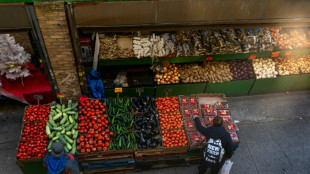
-
 Say cheese! 'Wallace & Gromit' expo puts kids into motion
Say cheese! 'Wallace & Gromit' expo puts kids into motion
-
BP profits slide awaiting new CEO

-
 USA's Johnson sets up Shiffrin for tilt at Olympic combined gold
USA's Johnson sets up Shiffrin for tilt at Olympic combined gold
-
Trump tariffs hurt French wine and spirits exports

-
 Bangladesh police deploy to guard 'risky' polling centres
Bangladesh police deploy to guard 'risky' polling centres
-
OpenAI starts testing ads in ChatGPT

-
 Three-year heatwave bleached half the planet's coral reefs: study
Three-year heatwave bleached half the planet's coral reefs: study
-
England's Buttler calls McCullum 'as sharp a coach as I ever worked with'

-
 Israel PM to meet Trump with Iran missiles high on agenda
Israel PM to meet Trump with Iran missiles high on agenda
-
Macron says wants 'European approach' in dialogue with Putin
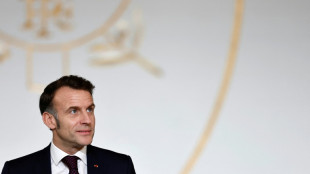
-
 Georgia waiting 'patiently' for US reset after Vance snub
Georgia waiting 'patiently' for US reset after Vance snub
-
US singer leaves talent agency after CEO named in Epstein files

| SCS | 0.12% | 16.14 | $ | |
| RYCEF | 3.04% | 17.41 | $ | |
| RIO | -0.56% | 96.31 | $ | |
| RBGPF | 0.12% | 82.5 | $ | |
| CMSC | 0.02% | 23.59 | $ | |
| NGG | 0.06% | 88.44 | $ | |
| GSK | -0.1% | 58.95 | $ | |
| RELX | 0.66% | 29.675 | $ | |
| AZN | 3.19% | 194.198 | $ | |
| BTI | -2.51% | 59.65 | $ | |
| VOD | -0.99% | 15.329 | $ | |
| JRI | 0.08% | 12.82 | $ | |
| BCC | 1.28% | 90.17 | $ | |
| BCE | 1.33% | 25.965 | $ | |
| CMSD | 0.08% | 23.99 | $ | |
| BP | -6.92% | 36.68 | $ |

In Ecuadoran Amazon, butterflies provide a gauge of climate change
Biologists on a trail in the Ecuadoran Amazon hold their breath as they distribute a foul-smelling delicacy to lure butterflies, critical pollinators increasingly threatened by climate change.
A team has hung 32 traps made of green nets, each baited with rotting fish and fermented bananas. They are meant to blend in with the forest canopy. Their pungent odor clearly does not.
Since last August, a team of biologists and park rangers has been monitoring butterfly numbers in the Cuyabeno Wildlife Reserve, a park famed for its abundant flora and fauna.
They catch and document the colorful insects, releasing most with an identifying mark on their wings. Some of them, possibly from previously unknown species, are kept for further study.
The results of the team's work, however, have been discouraging.
Butterflies are "bioindicators," living organisms whose well-being provides a measure of the health of their surrounding ecosystem, and their numbers are decreasing, biologist Maria Fernanda Checa told AFP.
While the number of species may not have declined by more than 10 percent, in terms of absolute butterfly numbers "the decrease is very significant... maybe 40/50 percent," she said.
"It is something that alarms us."
- Bioindicators -
Under expedition leader Elisa Levy, a team checks the nets for captured butterflies.
They hold the insects delicately by their tiny abdomens and manipulate their legs and wings with tweezers.
Some are bright red and blue, others have what resemble zebra stripes. Some are see-through, like glass.
About three-quarters of fruit- or seed-producing crops for human consumption depend on pollinators, which provide a free service worth billions of dollars.
The UN has warned that 40 percent of invertebrate pollinators -- particularly bees and butterflies -- risk global extinction, posing certain risks to humanity itself.
Butterflies, said Checa, are "very sensitive, even to small changes in the ecosystem" throughout their short lifespan from egg to caterpillar to reproductive adult.
Levy explained that tropical plants -- unlike ones in regions with distinct seasons -- are not accustomed to extreme weather variations.
If they do not adapt to a fast-changing climate, these plants could be lost, along with the butterfly larvae that feed on them.
Ecuador, relatively small but extremely biodiverse, hosts about 4,000 butterfly species -- nearly as many as its much larger neighbors Peru and Colombia.
Yet in places like the Yasuni National Park, which neighbors Cuyabeno, "the rate of species discovery is slower than the rate of extinction," said Checa.
D.Kaufman--AMWN
